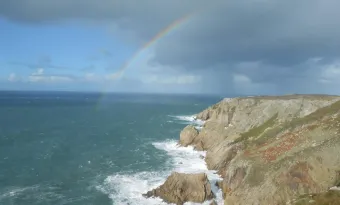
- Scientists have contributed to a new report by the UK Marine Climate Change Impacts Partnership (MCCIP).
- Key findings have been shared on ocean topics including how climate change is impacting storms/waves and sea temperature around the UK.
- By providing evidence to policy makers we're supporting our strategic goal to translate research into action and positive change.
World-leading scientists from the National Oceanography Centre (NOC) have made a substantial contribution to the latest report from the UK Marine Climate Change Impacts Partnership (MCCIP), which demonstrates the effects climate change is having on UK seas and coastlines.
MCCIP provides a co-ordinating framework for the UK, delivering high quality evidence on marine climate change impacts, and guidance on adaptation advice, to policy advisors and decision-makers.
The reports are divided into three themes: Physical environment, Ecosystem change, and Societal impact, with NOC authors contributing across the board. The reports cover a range of important marine and coastal topics including the impact of climate change on storms and waves in the UK and Ireland, sea temperature, sea-level rise and ocean circulation.
Dr Lucy Bricheno, lead of storms and waves research in the report said: "I'm really glad that so many NOC authors can contribute their expertise to these reports, they are a valuable way to get the latest science advice to policy makers. The MCCIP storms and waves report card explains how climate change is impacting storms and sea waves around the UK. The Atlantic storm track is shifting, so that while UK waves are becoming calmer on average, the most extreme storms and associated waves are becoming more intense and more frequent”.
Dr Richard Cornes, who led the section on changes in sea temperature said: “Evidence presented in the new report indicates a continued rise in sea temperature around the UK. Early results from a new run of climate simulations show a projected increase of 3°C in annual average sea-surface temperature by the end of the century compared to current conditions under the high-emission business-as-usual scenario”.
Other headline findings from NOC contributions include projections of a weakening Atlantic Meridional Overturning Circulation caused by human-driven climate change and the risks posed by continued sea level rise.
View the full list of topics and authors
If you’d like to hear from the experts themselves, sign up for the upcoming MCCIP ‘rolling evidence’ webinar. Learn how the evidence base has moved on in these key areas since MCCIP last reported in 2020 from presenters including NOC’s Leader of Shelf and Coastal Impacts Dr Lucy Bricheno and Senior Research Scientist Dr Richard Cornes.